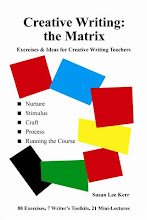Maybe, too, my lapse was a waa-hoooo!! having reached a readable 10,000 words 4-chapter section of the story of my great-grandfather... a long, long, too-long project. I think I needed to flap in the breeze, lose my grip, let go... choose your metaphor. Time to get back in the saddle.
So because I have something to celebrate (see below) and because I feel I owe you reparation (a Kleinian word!) today I'll give you one of my favourite exercises from the Hero's Journey. We are in week 3 now, and the well-bonded class had a great time brainstorming story arcs in a structure exercise. But this one, The Mentor's Gift, is from week 2.
The archetypal concept of the Mentor is a character or force who acts as a guide, teacher/coach to the main character. He or she may give or award the main character skills or equipment or just words of wisdom and support, but always strenghtens the hero's confidence, courage and motivation.
For the exercise, you, as tutor, need to have what I call a Serendipity Bag, a motley collection of objects. Mine includes a tiny teddy bear, an empty cello-tape dispenser, a fancy little hand mirror, a sea-worn shell, a key chain, a coloured-lead pencil, a marble etc etc. After explaining the role of the Mentor, you take the bag around to the students, who one by one plunge a hand into the bag and draw out an item. Ask them to contemplate the object for a bit, and then ask this series of questions, using the example of a ring as illustration. They simple jot or write phrases or a few sentences -- this is an exploratory, stimulus exercise. I direct them to list several ideas, to keep loose and stir possibilities. This is not the time to commit.
1) What physical qualities does this gift have? Strictly its physicality.
e.g., a ring: it is round, circle, whole, hard, gold, shining...
2) What meaning does this object have, what use or function?
e.g., a ring: eternity, bond, whole, joined, perfection, union, marriage, wealth, forever, return...
3) If it had magic powers, what would these be?
e.g., flight, sight, travel, love, riches, power...
4) What could it mean to your hero; when she/he looks at or thinks of it later on in the story, what does she/he feel and think? At their darkest hour the mentor's gift gives the strength to go on.
e.g., 'Love is what matters most'. Or 'Keep faith, believe in him.' Or 'We are together, no matter what.'
This exercise gives the writer insight into the main character (hero), as well as the Mentor. Each time I teach it I draw an object from the Serendipity Bag and do the exercise with the students using a character I am working on. Even using the same character several times I learn new depths of him/her, and get new ideas for the story.
To be continued within 24 hours!! Off to see Bright Star. Back now -- it is slow, but deep. I emerged feeling that I had actually lived at the pace of real life (nearly). It is not 'exciting'; it is real. What's more, my lovely husband recited Ode to a Nightingale to me from memory as I drove us home. Our anniversary tomorrow and dear reader, I'm glad I married him.
* GOOD NEWS! NAWE's Writing in Education has given my Creative Writing: the Matrix a glowing review!


